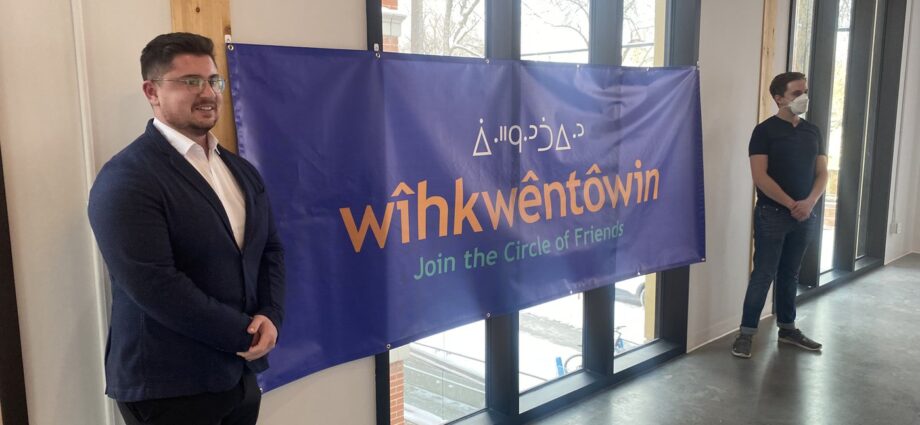
By Jeremy Appel, Local Journalism Initiative Reporter, Alberta Native News
January 26, 2024
(ANNews) – The new name of Edmonton’s Oliver neighbourhood was revealed on Jan. 23 at a venue that could be known in the future as Wîhkwêntôwin Square.
The renaming of Oliver as Wîhkwêntôwin, which means ‘circle of friends’ in Cree, is the culmination of a process initiated by neighbourhood residents and endorsed by the local community league in 2020, which launched the educational #UncoverOliver campaign.
That campaign has now been rebranded as #UnveilWîhkwêntôwin.
Elder Jo-Ann Saddleback, a neighbourhood resident who sat on the community league’s renaming committee, highlighted the welcoming nature of the Wîhkwêntôwin name in her remarks at the Jan. 23 event’s outset.
The new name is intended “to invite everyone here, whether you’re a tourist or residents or here for business, here visiting relatives [and] welcome you to come into that friendship circle,” Saddleback told event attendees.
It’s the first example in Canada of a community-led process to rename a neighbourhood that was originally named after a problematic individual.
Frank Oliver, publisher of the Edmonton Bulletin and an Edmonton MP who rose the ranks of Wilfrid Laurier’s Cabinet, used his platform to advocate for dispossessing Indigenous Peoples.
He was directly responsible for the Papaschase Band’s removal from its Treaty 6 lands to make way for an expanding Edmonton, which was facilitated through the 1880s and ‘90s.
The community formerly known as the West End was named after Oliver in 1937, four years following his death.
With 18,180 residents, according to the 2019 City of Edmonton municipal census, Oliver is Edmonton’s most populous neighbourhood.
Community league president Imran Ahmad told reporters that the renaming process took years because of the neighbourhood’s sheer size and density, combined with the community league’s commitment to broad consultation.
“Making sure we’re doing the right steps, talking to the right people, engaging with the right people, and taking the time to do it with intention was really important, especially if we’re going with indigenous reconciliation lens to … make sure we’re following the right steps and procedures along the way,” Ahmad explained.
He said he doesn’t foresee the renaming changing much else, beyond making the neighbourhood more inclusive and bringing it closer in touch with its “ancestral roots.”
“I live here. I love living here. I love living in Oliver and I love living in Wîhkwêntôwin going forward,” said Ahmad.
He added that he’d like to see the Oliver renaming serve as a “benchmark for other communities to do so if other committees choose to … follow in our footsteps.”
Robyn Paches, who was president of the community league when the renaming process began, said it was important to ensure “it was educational from the start,” so nobody could forget who Frank Oliver was and what role he played in founding Edmonton.
“Important, big change takes a lot of time, and it takes a lot of important steps. Some people will gripe about bureaucracy, but I’m really happy to see that it did take us this long, because of the fact that a major name change and identity change in a city as big as Edmonton is an important change,” he said.
The name change isn’t official yet. It needs to go before city council for approval next month, which the local councillor said will occur on Feb. 20.
Coun. Anne Stevenson, whose Ward O’Day’min includes Wîhkwêntôwin, told reporters that she expects the renaming to sail smoothly through council chambers.
Subscribe to our newsletter.
“The name just fits,” said Stevenson. “Of course, transitions are always challenging, but I think there’s strong support for it and a desire to be using a new name.”


